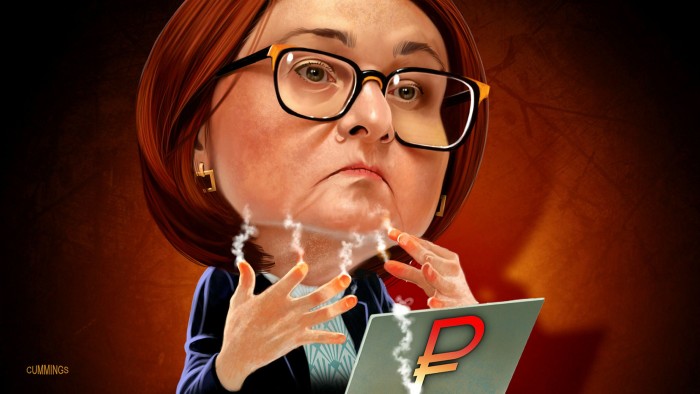Elvira Nabiullina, a technocrat plunged into chaos at Russia’s central bank


Roula Khalaf, Editor of the FT, selects her favourite stories in this weekly newsletter.
As Elvira Nabiullina steered Russia through a series of economic shocks over the past few years, investors anxiously watched the central bank governor’s rotating collection of brooches for macroeconomic policy clues. A hawk signified a return to key interest rate hikes; a rain cloud meant she wanted to dampen inflation expectations.
But after devastating western sanctions sent the rouble tumbling 29 per cent below its previous historic lows on Monday, Nabiullina sat ashen-faced alongside the economic cabinet at the other end of a 20ft-long table from Vladimir Putin, clad all in black — and with no brooch in sight.
“Nabiullina ran through every kind of stress test, but not a war,” says a former senior official who knows her. “Nobody told her this was coming.”
The conflict in Ukraine has stretched the governor’s ability to keep the economy on the rails. Though she spent years patiently building up a $643bn war chest as part of a “Fortress Russia” strategy aimed at insulating the country from sanctions, western restrictions meant she was unable to deploy it.
Panicked Russians formed long queues outside bank branches. Even as the central bank froze trading on the Moscow exchange, shares in London-listed Russian companies fell 98 per cent. In response, Nabiullina more than doubled Russia’s key interest rate to 20 per cent, admitting its economy was “dealing with a completely non-standard situation” under “conditions that have fundamentally changed”.
To ease the pressure, Putin authorised capital controls that force Russian companies and individuals to sell 80 per cent of their foreign currency revenue, ban Russians from transferring foreign currency abroad and forbid taking out any new foreign loans.
“They’re desperate measures in a desperate situation. And she pretty much has no choice,” says Sergei Guriev, an economist at Sciences Po university in Paris. “I don’t know what you can do when things like this happen.”
But such drastic moves have shocked Nabiullina’s longtime confidants. “I respect her so much. She’s so smart,” says a senior Russian banker. “But she once told me that if capital controls were introduced, she would resign. Now capital controls have been introduced and she didn’t resign.”
A lover of French poetry and opera, Nabiullina — an ethnic Tatar and one of Russia’s few female senior officials — has shown steely determination since taking up her job in 2013. Nabiullina faced her first big test in 2014 when plummeting oil prices, coupled with the first US and EU sanctions over Ukraine, halved the rouble’s value against the dollar. She initially burnt through more than $70bn propping it up, then switched to a free float and hiked up interest rates to 17.5 per cent.
Although Russia plunged into recession, Nabiullina stuck to her ultra-conservative monetary policy. Within a few years, the country returned to growth and inflation sank. That success led multiple publications to name her the world’s best central banker and earned her Putin’s trust, according to two longtime mutual acquaintances. He praised Nabiullina for laying a “macroeconomic foundation” and commended her “energetic efforts [against] banditry” in a crackdown on banking corruption.
Yet her foreign counterparts also came to associate her more and more with Putin. “She is a very professional, experienced macroeconomist and central banker. No doubt about that,” says Valeria Gontareva, who headed the Ukrainian central bank from 2014 until 2017. “But without values, your professionalism is nothing.”
Just before Russia began massing troops and equipment at the Ukrainian border, Nabiullina appeared more successful than ever. She spoke of getting post-pandemic inflation even lower than the 4 per cent target. She found backing for one of the world’s harshest stances on cryptocurrencies. But her work has now been turned upside down: currency controls are artificially boosting the rouble, while Russians are turning to crypto to avoid the sanctions.
“The only way forward for her is to fix [foreign exchange rates], do all the restrictions right now, stop the banking panic — and send in her resignation letter. And she will be a respected person in the world,” said Gontareva, the former Ukrainian central banker. “Otherwise, you know, she will be sitting in The Hague with all these bandits.”
So far, Nabiullina has not commented directly on the conflict but some of her stunned friends believe she shares their horror at events in Ukraine.
Others have made what they describe as stark moral choices. Boris Lvin, a senior adviser to Russia’s representative at the World Bank, told colleagues that “in view of the ongoing events I can no longer associate myself with my government.” Oleg Anisimov, a senior Russian climate delegate, told a summit he could not find “any justification” for the war.
Even as the situation deteriorates, Nabiullina may have made up her mind, however. “She thinks this job is important for Russian citizens and that she does it better than anyone else, which is not unlikely. So she needs to be loyal to Putin and not step down,” Guriev says. “If she starts speaking against Putin, she will be kicked out and will not be able to help the Russian people.”
Comments